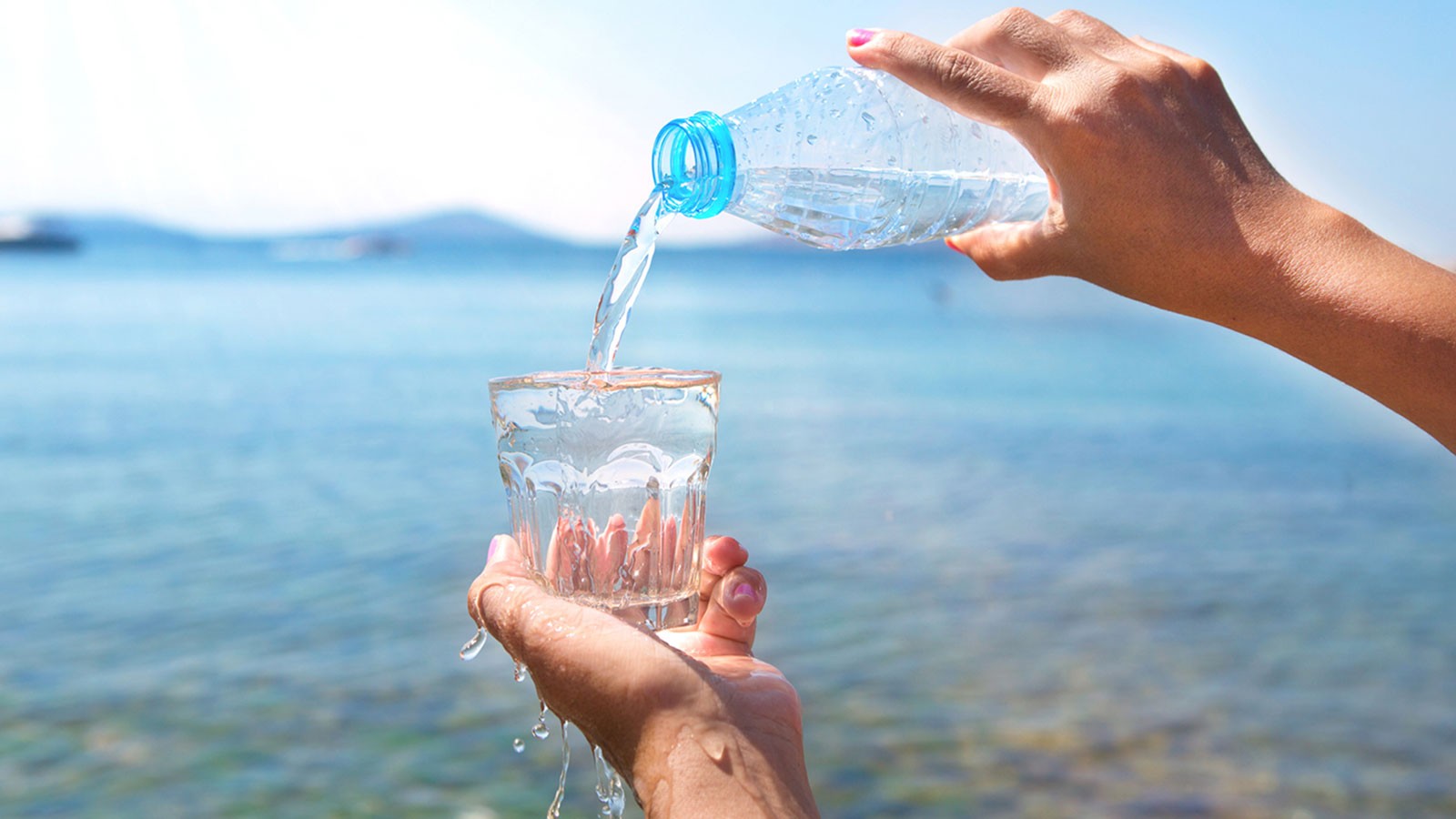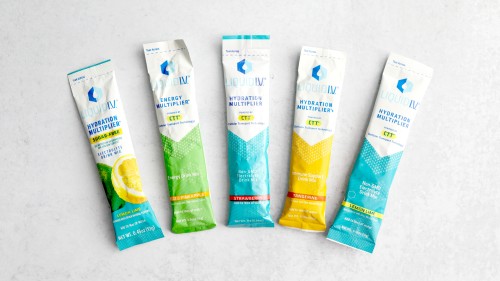8 Health Benefits of Drinking Enough Water
Published on January 5, 2022
Medically Reviewed by Ana Reisdorf, MS, RD
Do you drink enough water? Water is one of the most essential nutrients for sustaining life, but there are also many additional benefits to making sure you are getting enough.


Water is an essential requirement for life. Not only is it necessary for plants to grow and support our environment, but it is also needed for hundreds of different processes in our bodies.
The human body is made up of approximately 60% water, distributed throughout your blood, muscles, organs, tissues, plasma, and interstitial tissues.
The exact amount of water in your body is dependent on several factors, such as age, gender, body fat, and how much muscle mass you have.
No matter how much of your body is made out of water, it’s important to stay hydrated! There are many health benefits from drinking water beyond preventing dehydration.
This article shares the top health benefits of drinking water and how you can make sure you’re getting enough for your body.
Health Benefits of Water
Water plays an essential role in homeostasis or the state of balance in the body. Many of the health benefits from drinking water come from its ability to help restore balance in the body.
May Support Normal Brain Function
Water intake may help support healthy cognitive function and improved mood.
Mild to moderate dehydration may decrease cognitive function by negatively impacting concentration, alertness, psychomotor skills, short-term memory, math skills, and perception. (1)
Studies on water intake and cognitive performance find that drinking water after mild dehydration can increase alertness in adults. (2)
A 2020 study found that hydration status and water intake were moderately associated with improved attention and cognitive processing speed among older women. (3)
Hydration status may also play a role in mood regulation.
A 2014 study found that individuals who reduced their water intake from 2–4 L per day to 1 L per day had decreased calmness, vigor, contentedness, and fewer positive emotions. (4)
Alternately, those who initially drank less than 1.2 L of water per day and increased intake to 2.5 L per day had decreased fatigue, confusion, and feelings of bewilderment.
Summary
Water helps support brain function, alertness, cognitive processing, attention, and mood.
May Reduce Headaches and Migraines
Drinking enough water every day may have a positive impact on reducing migraine headaches and their severity.
A 2020 study examined the relationship between daily water intake and migraine headache characteristics in women. (5)
The women in the study kept a 30-day headache diary and filled out a questionnaire on their normal water and tea intake.
Women who reported a higher daily water intake had a significantly lower frequency of migraine headaches, shorter duration of headaches, decreased pain severity, and decreased severity of migraine disability.
Dehydration may be a trigger for migraine headaches, so it is thought that adequate hydration (about 2–3 L of water daily) may help treat migraine conditions. (6)
Small intervention studies suggest that increasing water intake may reduce the number of headache hours, the intensity of headaches, and quality of life in some cases. (7, 8)
More clinical trials need to be done to determine if increasing baseline water intake has a positive impact on headaches.
Summary
Staying hydrated can help reduce the number and severity of headaches and migraines.
Can Improve Exercise Performance
Proper hydration can support your exercise performance and recovery.
During exercise or other types of physical activity, you can lose a significant amount of water through your sweat.
Exercise-related dehydration has been associated with increased tiredness, reduced endurance, difficulty regulating body temperature, reduced motivation, and increased perceived effort to complete a task. (9)
A 2018 study in collegiate athletes found that individualizing hydration based on fluid and sodium losses was able to improve attention and awareness, increase anaerobic power, and improve heart rate recovery time. (10)
The composition of fluids may also impact exercise performance and recovery.
A 2018 review found that hydration with functional beverages containing carbohydrates may be beneficial for both exercise performance and post-exercise recovery. (11)
Beverages containing omega-3 fatty acids, amino acids, and proteins may be beneficial for post-exercise recovery.
Summary
Staying hydrated improves exercise performance and recovery.
May Improve Skin Health
Drinking water can be beneficial for reducing skin aging by improving skin hydration and elasticity, and decreasing skin roughness.
A 2018 review on dietary fluid intake and skin hydration found that adding approximately 2 L of water to your daily fluid intake for 30 days can improve skin health. (12)
Benefits of adequate hydration included improved skin elasticity, decreased dryness and roughness of skin, and generally improved skin hydration. These effects may be greater in people who usually had lower water intake before intervention.
The reviewers noted that the evidence was overall somewhat weak due to the small number of studies available and the quality of their methods, so more research needs to be done.
Summary
Drinking water supports skin health and hydration.
Can Help Regulate Bowel Habits
Water intake can improve symptoms of constipation and make it easier for you to have regular bowel movements.
In order to pass solid waste throughout your colon, you require some water to keep your stool soft. Of course, this isn’t the only factor determining how frequently you poop, but it can make a difference.
An early study found that fluid restriction of 500 mL per day significantly decreased stool frequency and stool weight compared to an oral fluid intake of over 2,500 mL daily. (13)
A 2017 review on fluid intake in the prevention and treatment of functional constipation in children and adolescents found an association between low fluid intake and constipation. (14)
Water intake as an intervention for constipation has not been consistently shown to be beneficial for relieving symptoms.
There are few studies available on the matter, and existing studies are hard to compare due to differences in methodologies.
However, it is still believed that fluid intake has a role in the prevention and treatment of constipation along with other lifestyle behaviors and interventions. (15)
Summary
Staying hydrated is essential for good digestion and reducing constipation.
May Support Healthy Kidney Function
Drinking water is essential for having healthy kidneys. Adequate water intake reduces the risk of kidney stones and makes urine production more efficient.
A 2016 review and meta-analysis found that high fluid intake could decrease the risk of kidney stones compared to individuals with low fluid intake. (16)
High fluid intake was defined by at least 2.9 L or more fluids daily to increase urine output and decrease stones.
The American Academy of Family Physicians recommends an intake of 2.5 to 3 L of water daily to prevent recurrent kidney stones. (17)
Studies find that increasing water intake can reduce the occurrence of UTI and the need for antibiotics for the prevention or treatment of UTIs. (18)
Dehydration is linked to acute kidney injury and the progression of chronic kidney disease.
A phenomenon called Mesoamerican Nephropathy is common amongst male agricultural workers in Central America. In this condition, repeated dehydration may increase the risk of acute kidney injury related to work-related hazards. (19)
Adequate fluid and water intake may protect against kidney damage and makes urine production and toxin excretion easier. (20)
Summary
Water helps the body flush toxins via the kidney and maintains kidney health.
May Support a Healthy Metabolism
Being adequately hydrated may influence hormone production in metabolism and impact insulin sensitivity, liver function, and fat distribution.
Vasopressin, also known as the antidiuretic hormone, helps the kidneys reabsorb water into the body. When you don’t consume enough water, you produce more vasopressin and your kidneys have to work harder to concentrate your urine.
Vasopressin not only affects your kidneys, but it has an impact on metabolism by affecting the secretion of insulin and glucagon, glycogen storage and use in the liver, and the metabolism of certain amino acids. (21)
These metabolic changes can increase glycemia (the amount of glucose in the blood) and increase the risk of metabolic conditions.
A 2020 analysis of the Korea National Health and Nutrition Examination Survey 2008–2010 suggests that low hydration status may be associated with insulin resistance and body fat distribution. (22)
Individuals with lower hydration had greater trunk fat, decreased leg fat, and an increased trunk to leg ratio.
Trunk fat is associated with increased insulin resistance and liver disease risk, and a higher trunk to leg fat ratio can also be a measure of insulin resistance in some populations. (23, 24, 25)
Animal studies and some human studies suggest that water intake may help with weight loss and fat burning. (26)
Summary
Adequate hydration supports metabolism, normal blood sugar, and possibly weight loss.
Related: 11 Evidence-Based Ways to Boost Metabolism
May Support Heart Health
Another benefit of hydration is to protect your cardiovascular health. Water is necessary for regulating our blood pressure and supporting the function of our vascular system.
A 2019 review examined the relationship between hydration status and cardiovascular health and found that hydration had several health benefits. (27)
Hydration allows endothelial cells within blood vessels to properly respond to stress, regulate temperature, and support blood regulation.
During exercise-induced dehydration, drinking water helped maintain blood flow to the brain, impacting cognitive function.
Hydration status influences blood pressure at rest, during orthostatic stress (when moving from sitting/laying down to standing), and during exercise.
Summary
Mild dehydration can negatively impact the cardiovascular system, especially during exercise or heat stress.
How Much Water You Need
You may have heard the general advice to drink 8 glasses of water per day in order to be hydrated, but hydration is a bit more complicated than that.
The Institute of Medicine created guidelines for how much water we should get daily to be hydrated.
The Dietary Reference Intakes (DRI) recommends that men get approximately 3.3 liters and women get 2.6 liters of water daily through combined water and food intake.
If we’re looking at only oral beverage intake, men should have 3 liters of water daily, and women should drink 2.2 liters of water.
These guidelines are simply a starting place to support your water drinking.
Several additional factors may alter your water needs, for example, humidity, environmental temperature, altitude, exercise, medical conditions, and food intake.
You can listen to your body to know when you’re feeling thirsty and when you may need to drink additional water. The most common sign to watch out for is the desire to drink something.
Some people do not have a regular desire to drink water and should take care to regularly drink water even if they don’t feel a strong thirst.
Dehydration is a condition caused by a negative balance of fluid in the body – meaning that you’re losing more fluids than you’re taking in and need to increase your water intake.
Dehydration may cause symptoms such as:
- Dry mouth or eyes
- Headaches and migraines
- Lack of sweat
- Feeling constipated
- Darkened color of urine
- Fatigue
- Dizziness
- Confusion
- Fever
- Bad mood
- Dry or tented skin
If you feel frequently thirsty despite adequate hydration, this may be a symptom of a severe health condition and you should speak with your doctor.
Drinking too much water can also lead to some unintended consequences. Overhydration from excessive water intake or water retention can cause your body’s electrolytes to become imbalanced.
Overhydration through rapid intake of 3 to 4 liters of water may result in hyponatremia.
Hyponatremia (sodium levels below 135 mg/dL) can be a result of overhydration and lead to symptoms such as: (28)
- Nausea and vomiting
- Loss of appetite
- Neurological abnormalities (including altered mental status)
- Frequent falls
- Disturbances in gait
- Muscle cramps or weakness
In severe cases, hyponatremia from overhydration may require medical treatment consisting of fluid restriction and medications like diuretics.
Summary
Fluid needs should be individualized based on gender, activity level, weather, and age. While water is essential, it is possible to be overhydrated as well.
Ways to Hydrate
No matter how you choose to increase your fluid intake, it is important to spread out your hydration throughout the day.
Your hydration can come from drinking water, but there are also alternate beverages and foods that can support your overall fluid intake.
Fluids you can hydrate with include tea, sparkling water, kombucha and other fermented beverages, juice, milk, and milk alternatives.
Certain beverages may be more hydrating than others.
For example, one 2015 study found that an oral rehydration solution, full-fat milk, and skim milk were less hydrating than plain water or other beverages. (29)
If you are going to drink caffeine-containing beverages, limit your caffeine intake to 400 mg/day or less to reduce the mild diuretic effects of beverages like coffee or black tea.
Some foods naturally have high water content or are made with water.
Various soups, fruits, cucumber, lettuce, and zucchini are examples of foods with high water content and can help quench your thirst.
Try getting your fluid intake from a number of sources, but I recommend prioritizing your water intake. This can be very helpful if you have any medical conditions that may limit your intake of other kinds of hydration sources.
Summary
While water should be prioritized, there are many ways you can meet your fluid needs.
Frequently Asked Questions
What are the benefits of drinking water?
Drinking water may be beneficial for cognitive function and mood, reducing migraines, improving exercise recovery and performance, improving skin health, regulating bowel movements, supporting kidney function, promoting healthy metabolism, and supporting a healthy cardiovascular system.
How much water should I drink daily?
Men should have 3 liters of water daily, and women should drink 2.2 liters of water.
You may require additional water based on daily humidity, environmental temperature, altitude, exercise, medical conditions, and food intake.
What are the signs of being dehydrated?
Signs of dehydration include feeling thirsty, dry mouth or eyes, headaches and migraines, lack of sweat, constipation, dark urine color, fatigue, dizziness, confusion, fever, bad mood, and dry or tented skin.
Should I only drink water when I’m thirsty?
Not everyone feels thirsty when they haven’t had enough water, so that should not be the only signal to drink water.
Try to drink water at regular intervals throughout the day, and to compensate for any losses through sweating.
What are other ways to stay hydrated?
In addition to plain water, you can stay hydrated with beverages like tea, coffee, sparkling water, kombucha/fermented beverages, milk, and milk alternatives in moderation.
Some foods are high in water and can also help hydrate you such as soups, fruits, cucumber, lettuce, and zucchini.
A Word from Our Dietitian
Becoming a regular water drinker can be a journey. I’ve known many people who say that they’re not used to drinking water, or that they don’t like its plain taste.
If you’re not used to drinking a lot of water, it’s okay to start slowly.
Try replacing one cup of juice or other sugar-sweetened beverage with one glass of water daily, then increase your water intake gradually as you become used to it.
Some people find the transition to drinking water easier if they give their water some flavor.
You can flavor your water by:
- Adding lemon or lime juice
- Adding mint, basil, or ginger slices
- Diluting juice with water
- Adding cucumber slices
- Making herbal teas
- Drinking flavored seltzer or sparkling water
- Using water flavor enhancers
Outside of adding a bit of flavor to your water, you should be purposeful about getting more water.
Here are some tips for creating more opportunities to drink water:
- Invest in a reusable water bottle that you can carry around
- Place a glass of water by your bedside so you can drink water during the night or when you wake up
- Download a free water drinking app that reminds you when to drink water
- Create a challenge with someone you know so that you can be accountability partners for drinking water
Once you start drinking more water, you may begin to notice some of the health benefits of being well hydrated!
If you have certain medical conditions or note any edema on your body, you should speak with your doctor to determine the proper water intake to meet your needs.
At WellnessVerge, we only use reputable sources, including peer-reviewed medical journals and well-respected academic institutions.
- Water, Hydration and Health:
https://www.ncbi.nlm.nih.gov/pmc/articles/PMC2908954/ - Water ingestion improves subjective alertness, but has no effect on cognitive performance in dehydrated healthy young volunteers:
https://pubmed.ncbi.nlm.nih.gov/11895329/ - Cognitive performance in relation to hydration status and water intake among older adults, NHANES 2011-2014:
https://pubmed.ncbi.nlm.nih.gov/31776660/ - Effects of Changes in Water Intake on Mood of High and Low Drinkers:
https://www.ncbi.nlm.nih.gov/pmc/articles/PMC3984246/ - Association of drinking water and migraine headache severity:
https://www.jocn-journal.com/article/S0967-5868(20)30941-3/fulltext - Dehydration and Headache:
https://www.ncbi.nlm.nih.gov/pmc/articles/PMC8280611/ - Increasing the daily water intake for the prophylactic treatment of headache: a pilot trial:
https://pubmed.ncbi.nlm.nih.gov/16128874/ - A randomized trial on the effects of regular water intake in patients with recurrent headaches:
https://pubmed.ncbi.nlm.nih.gov/22113647/ - Fluid Balance in Team Sport Athletes and the Effect of Hypohydration on Cognitive, Technical, and Physical Performance:
https://pubmed.ncbi.nlm.nih.gov/28508338/ - Individualized hydration plans improve performance outcomes for collegiate athletes engaging in in-season training:
https://pubmed.ncbi.nlm.nih.gov/29866199/ - Role of Functional Beverages on Sport Performance and Recovery:
https://pubmed.ncbi.nlm.nih.gov/30308976/ - Does dietary fluid intake affect skin hydration in healthy humans? A systematic literature review:
https://pubmed.ncbi.nlm.nih.gov/29392767/ - Low fluid intake lowers stool output in healthy male volunteers:
https://pubmed.ncbi.nlm.nih.gov/2288138/ - Water and fluid intake in the prevention and treatment of functional constipation in children and adolescents: is there evidence?:
https://pubmed.ncbi.nlm.nih.gov/28450053/ - Management of functional constipation in children and adults:
https://www.nature.com/articles/s41575-019-0222-y - Treatment effect, adherence, and safety of high fluid intake for the prevention of incident and recurrent kidney stones: a systematic review and meta-analysis:
https://pubmed.ncbi.nlm.nih.gov/26022722/ - American Academy of Family Physicians: Kidney Stones: Treatment and Prevention:
https://www.aafp.org/afp/2019/0415/p490.html - Effect of Increased Daily Water Intake in Premenopausal Women With Recurrent Urinary Tract Infections A Randomized Clinical Trial:
https://jamanetwork.com/journals/jamainternalmedicine/fullarticle/2705079 - Mechanisms by Which Dehydration May Lead to Chronic Kidney Disease:
https://www.karger.com/Article/FullText/381239 - Hydration for health hypothesis: a narrative review of supporting evidence:
https://link.springer.com/article/10.1007/s00394-020-02296-z - Vasopressin: physiology, assessment and osmosensation:
https://onlinelibrary.wiley.com/doi/10.1111/joim.12645 - Low hydration status may be associated with insulin resistance and fat distribution: analysis of the Korea National Health and Nutrition Examination Survey (KNHANES) 2008-2010:
https://pubmed.ncbi.nlm.nih.gov/32189605/ - Associations of Trunk Fat Depots with Insulin Resistance, β Cell Function and Glycaemia - A Multiple Technique Study:
https://journals.plos.org/plosone/article?id=10.1371/journal.pone.0075391 - Trunk Fat is Associated with Increased Serum Levels of Alanine Aminotransferase in the US:
https://www.ncbi.nlm.nih.gov/pmc/articles/PMC2847039/ - Limb Fat to Trunk Fat Ratio in Elderly Persons Is a Strong Determinant of Insulin Resistance and Adiponectin Levels:
https://academic.oup.com/biomedgerontology/article/62/9/997/525963 - Increased Hydration Can Be Associated with Weight Loss:
https://pubmed.ncbi.nlm.nih.gov/27376070/ - Hydration Status and Cardiovascular Function:
https://www.ncbi.nlm.nih.gov/pmc/articles/PMC6723555/ - Hyponatremia: A practical approach:
https://www.ncbi.nlm.nih.gov/pmc/articles/PMC4192979/ - A randomized trial to assess the potential of different beverages to affect hydration status: development of a beverage hydration index:
https://academic.oup.com/ajcn/article/103/3/717/4564598






